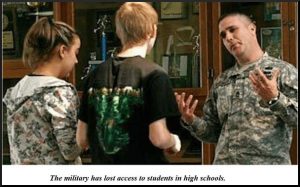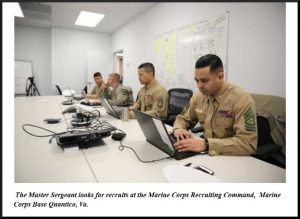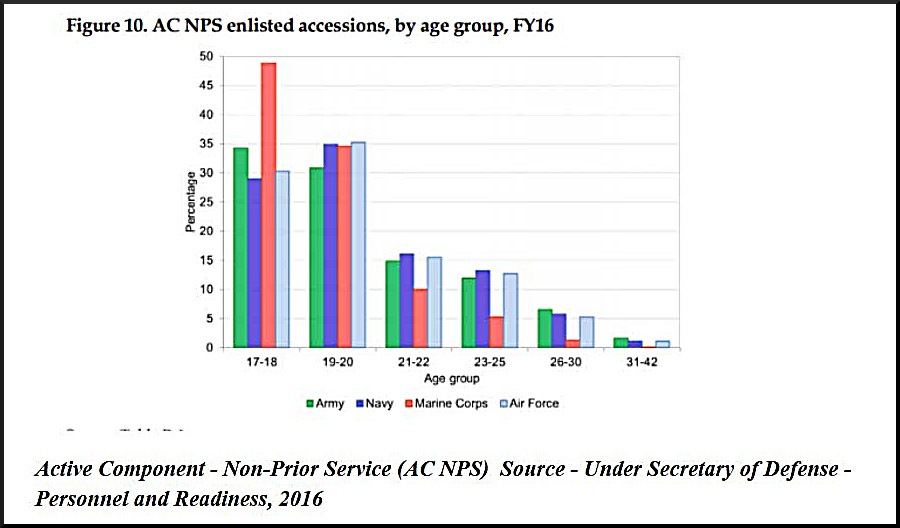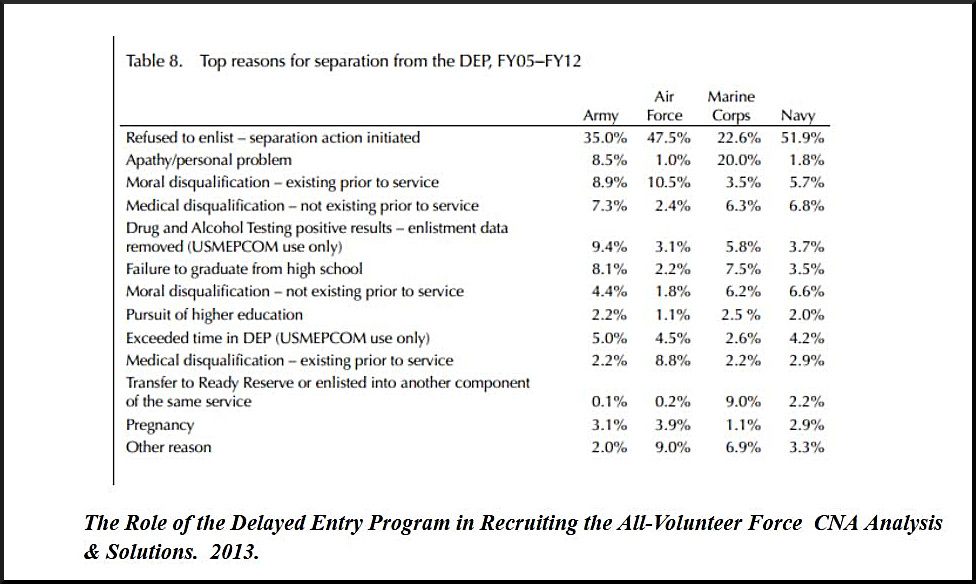How COVID-19 is impacting the Delayed Entry Program and threatening the health of recruits.
By Pat Elder, published on National Network Opposing the Militarization of Youth, NNOMY – June 8, 2020
COVID-19 has profoundly impacted the way the military finds new soldiers. The recruiting command was caught unprepared to face the pandemic and is facing a challenging new reality.
 Military recruiting is an intense, psychological pursuit that has traditionally relied on the ability of recruiters to develop close relationships with teenage prospects. These relationships were cultivated in the nation’s high schools where recruiters enjoyed access to children. Recruiters served as coaches and tutors. They brought donuts to the faculty. They ate lunch with prospects, sometimes a hundred times in a single school year. Military recruiters played one-on-one basketball after school with potential recruits and became best of friends with some kids. So friendly, hundreds of male recruiters have been implicated in inappropriate sexual relationships with underaged girls.
Military recruiting is an intense, psychological pursuit that has traditionally relied on the ability of recruiters to develop close relationships with teenage prospects. These relationships were cultivated in the nation’s high schools where recruiters enjoyed access to children. Recruiters served as coaches and tutors. They brought donuts to the faculty. They ate lunch with prospects, sometimes a hundred times in a single school year. Military recruiters played one-on-one basketball after school with potential recruits and became best of friends with some kids. So friendly, hundreds of male recruiters have been implicated in inappropriate sexual relationships with underaged girls.
High schools were the center of the recruiting universe, but that ended abruptly in March when the enlistment pipeline was ruptured. Recruiters enlisted seniors and placed them into the Delayed Entry Program (DEP) in which a student’s entry into active duty is postponed for up to 365 days. (The Army now calls it the Future Soldier Program.) The thrust of the DEP program is to maintain future soldier motivation while minimizing attrition. When DEP members report to basic training, they are accessed (enlisted) into active duty.
There are actually two enlistment-processing actions: contracting into the DEP and accessing into active duty. It’s the second one that matters.
 Youth take the Oath of Enlistment to enter the DEP. “I, _____, do solemnly swear that I will support and defend the Constitution of the United States against all enemies, foreign and domestic; that I will bear true faith and allegiance to the same; and that I will obey the orders of the President of the United States..”
Youth take the Oath of Enlistment to enter the DEP. “I, _____, do solemnly swear that I will support and defend the Constitution of the United States against all enemies, foreign and domestic; that I will bear true faith and allegiance to the same; and that I will obey the orders of the President of the United States..”
The DEP is the core component of the military’s recruiting process. If DEP members change their minds and decide not to enter the military, they are allowed to leave with no adverse consequences. Once they stop responding to their recruiter and they are out. When recruits fail to report to boot camp they are discharged. “It’s like waking up from a nightmare,” one enlistee explained. There is a long history of abuse by recruiters and the command toward DEP members who quit, while many youths and their families are unaware of the non-binding nature of the DEP.
Before the pandemic, seniors in the DEP were encouraged to spend a significant amount of time with other DEP members and their recruiter who indoctrinated them into a military culture with drill and ceremony, lessons on the chain of command, and rank structure.
 The recruiter’s close, personal involvement kept unpredictable youth from walking away. Impetuous teens who turn 18 often sign up without clearly thinking it through. While recruiting behavior in the nation’s high schools has become increasingly predatory, the American Public Health Association says there is significant evidence that the adolescent brain is not equipped to make accurate risk calculations. The kids often express ‘buyer’s remorse” so the job of the recruiter is not just to get seniors to sign up, but to keep them in the DEP until its time to ship to boot camp. This is precisely where the military is most vulnerable to the upheaval caused by the pandemic.
The recruiter’s close, personal involvement kept unpredictable youth from walking away. Impetuous teens who turn 18 often sign up without clearly thinking it through. While recruiting behavior in the nation’s high schools has become increasingly predatory, the American Public Health Association says there is significant evidence that the adolescent brain is not equipped to make accurate risk calculations. The kids often express ‘buyer’s remorse” so the job of the recruiter is not just to get seniors to sign up, but to keep them in the DEP until its time to ship to boot camp. This is precisely where the military is most vulnerable to the upheaval caused by the pandemic.
A study that analyzed data on over 1.3 million DEP participants from FY05 to FY12 found that attrition increases the longer a member is in the DEP, so it’s necessary for the branches to quickly move recruits who signed up earlier in the academic year to boot camp. Historically, almost half of those in the Army’s Future Soldier program are in the DEP for two or fewer months. Many sign up in April and May and they’re shipped to boot camp in June and July. Only 15% stay in the DEP 7 or more months.
The Army had the lowest DEP attrition rate among the services at 11.0%. In contrast, over 40% of Marine Corps and Navy DEP members stay 7 or more months and have average DEP attrition rates of 17.8% and 20.8% respectively. The Air Force, with over 60% of its DEP lengths between 3 and 6 months, averaged a 12.7% attrition rate.
The DOD does not provide the current strengths of the DEPs in each branch, although we know many seniors don’t make up their minds until the 4th academic quarter – and this year, the quarter was cancelled due to COVID-19, leaving the DEP in peril.
The absence of the command’s human touch and the uncertainties of reporting to boot camp amidst stories of outbreaks at the Army’s Fort Jackson, Fort Benning, Fort Leonard Wood, or Marine Corps Recruit Depot San Diego, and Recruit Depot Perris Island have caused many to think twice about reporting to boot camp. Naval recruiting is facing public concern over COVID-19 outbreaks on 40 ships, most notably, stories of a thousand infected sailors on the USS Teddy Roosevelt.
Mothers of youth in the DEP have reached out, expressing deep concerns, while many teenage recruits may be oblivious to the dangers or have not developed adult reasoning capabilities, as the American Public Health Association suggests. The moms have every reason to be worried.
More than 140 Army soldiers and trainees at Fort Benning, Ga., and more than 70 at Fort Leonard Wood, Mo., tested positive for the coronavirus, the Army reported in early June.
At the Marine Corps’ Parris Island Recruit Depot in South Carolina, where an outbreak has been reported, the recruits wore masks in the larger formations, but during some physical tests — even those where teamwork was required and social distancing impossible — the masks came off. Most of the drill instructors wore theirs at all times, as did visiting Defense Secretary Mark Esper and his entourage when he visited at the end of May, according to Stars and Stripes.
The Marine Corps is not reporting on the number of COVID-19 infections at Parris Island, which is located within the area of zip code 29902. Data from the S.C. Department of Health and Environmental Control on June 6th shows that 99 confirmed cases and 608 suspected cases have been reported in zip code 29902 since the pandemic began June 6, 2020.
Stars and Stripes, a critical source of information pertaining to the military, reports that all of the services have recently experienced drastic declines in the number of recruits they added to their DEPs. Maj. Gen. Frank Muth, Commanding General, U.S. Army Recruiting Command said he expects to face a shortfall at the end of May of about 3,100 recruits with signed contracts.
On March 18, the Army shut down public access to its 1,400 recruiting stations. Within a week, more than 20,000 military recruiters were left to their cell phones, computer screens, microphones, cameras., and detailed personal information on tens of millions of American youth. The DOD must sign up 150,000 annually to stay even with those leaving the service. Muth said his decision to shutter stations from the general public was about protecting his own people.
The Navy saw a 45% dip in qualified individuals expressing interest in March, 2020, compared to March, 2019. The Air Force also saw drops in recruiting in March and April. The Marine Corps saw a drop of about 25% in contacts with qualified individuals in March over the same month last year.
Gunnery Sgt. Justin Kronenberg, a spokesman for Marine Recruiting Command, told Stars and Stripes, “Our systematic recruiting process has always placed a premium on ‘kneecap to kneecap’ interaction between a recruiter and applicant, so it may be challenging to replicate this physical assessment of those wanting to become Marines solely through tech mediums.”
Almost half of Marine Corps accessions are 18-years old. Those who are age 20 and younger made up 83% of Marine Corps recruits, 65% in the Air Force and the Army; and 64% in the Navy.
For at least a decade the Army has been aware that the way it recruits lagged behind technological advances employed by more sophisticated corporate recruiters. But the military enjoyed a captive high school audience so recruiters were occupied by “hanging out” with potential recruits in high school parking lots or setting up booths during career days or giving out free tchotchkes in high school cafeterias. They weren’t lurking in game rooms and on social media to the degree they are now.
Recruits completed various physical activities such as running, push-ups etc. Recruiters nurtured students and provided guidance. They encouraged future soldiers to invite parents, family, and referrals to DEP events. They played video games and they had pizza together.
The recruiting command understands the “recruiter-applicant-influencer relationship” is a significant cause of DEP attrition. Put another way, Johnny’s girlfriend or his mom may not want him to enlist. In the pandemic world, these “influencers” may have more of an upper hand over the virtual recruiter.
The command says contact between the recruiter and the DEP member and his or her influencers must be “frequent, genuine, honest, and forthright.” Surely, social media affords the frequency, but may be lacking in its ability to project recruiters as being genuine, honest, and forthright.
Human interactions cannot automatically be replicated through machines.
The following chart lists the top reasons for separation from the DEP. Although it is not specifically mentioned, the top reason is that the teenagers change their minds and no longer want to go. How many more in the DEP are changing their minds because of the coronavirus?
Military recruiting has shifted from an intensely personal pursuit to a comparatively sterile online experience. Recruiters spend most of their digital days on social media. 18-year-olds often don’t “do” email, and rarely talk on the phone, while text messages are frequently ignored. The trick for recruiters is to engage the teens on video platforms like Instagram, Facetime, and Zoom where recruiters can hope to humanize the interaction and build trust.
Recruiters host huge gaming tournaments promoting “Call of Duty” which is built around the combat portion of belonging to the military. Recruiters hope its visceral appeal and ability to attract large, nationwide audiences will allow them to collect leads.
The Army’s Joint Base Lewis-McChord Morale Welfare and Recreation Program (JBLM MWR) hosts these tournaments. They are sponsored by the United Services Automobile Association (USAA) and used by the recruiting command to keep DEP members in the loop and to reach new prospects. Chat rooms discuss things like the necessary number of kills to initiate killstreaks, or how important organization and teamwork are. Recruiters lurk in chat rooms.
The Army recently announced it is loosening restrictions on how recruiters may use Facebook. The Army instructs its recruiters:
“You can use your personal Facebook page to become an admin of a fan page. Anybody who has admin rights to the fan page can grant you admin rights to the fan page; your information will not be shared on the fan page and no one outside of the page admins will know that you are an admin of the fan page. Determine your own privacy settings; these will not be violated if you are a fan page admin. Direct traffic to your fan page and keep your personal life separate from work. In addition, it is strongly suggested that you use “friends only” privacy settings on personal pages to protect your personal information.”
The U.S. government is surreptitiously spying on our children.
 The laptops of recruiters are loaded with personal information on youth taken from social media sites. The information is merged with data from the DOD’s Joint Advertising Market Research and Studies Recruiting Database (JAMRS) and the result is staggering. The recruiter knows Johnny reads wrestling magazines, weighs 160, can bench press 180, drives a twelve-year-old Ford F150, and likes BTS and Kpop. And although they’ve never spoken, the local recruiter assigned to Johnny’s high school knows that Sam, his girlfriend, would love to see him enlist and that she loves Zendaya and they both enjoy kayaking. They even know Johnny’s mom doesn’t care much for Sam It sounds superfluous, but these kinds of details matter more today than ever. They provide a human connection before reaching out digitally.
The laptops of recruiters are loaded with personal information on youth taken from social media sites. The information is merged with data from the DOD’s Joint Advertising Market Research and Studies Recruiting Database (JAMRS) and the result is staggering. The recruiter knows Johnny reads wrestling magazines, weighs 160, can bench press 180, drives a twelve-year-old Ford F150, and likes BTS and Kpop. And although they’ve never spoken, the local recruiter assigned to Johnny’s high school knows that Sam, his girlfriend, would love to see him enlist and that she loves Zendaya and they both enjoy kayaking. They even know Johnny’s mom doesn’t care much for Sam It sounds superfluous, but these kinds of details matter more today than ever. They provide a human connection before reaching out digitally.
Recruiters track DEP members and potential recruits on social media sites for signs of disqualification, like weight, tattoos, problems with education, drugs, or law enforcement. Army recruiters use FBI Live Scan capability to conduct quick-turn-around fingerprint checks. Important documentation like diplomas, birth certificates, and Social Security cards are all relayed electronically now. With the exception of the physical examination, everything is done virtually. Recruiters have become something like associates at credit card, health care, and insurance company call centers.
When direct, personal contact is necessary with the recruiting command the health of DEP members is jeopardized. The Army Combat Fitness Test, a critical component of the recruitment process, can’t be accomplished through a computer screen. During the 2-mile run, the Army says, a limited number of lanes will be made available to runners. The pushups test requires another individual to properly count repetitions, but the tracking person can count at a 6-foot distance. Soldiers will be required to wipe down each piece of exercise equipment with sanitizer after completing the corresponding test. The Army may eventually figure it out, but it is likely to be at the expense of the health of thousands of 18-year-olds along the way. The virus will exploit the weakest link in the Army’s chain of viral defenses.
Once the candidates ship to boot camp, they are quarantined for two weeks. After that, the Pentagon seems to be making it up as they go along. In early May the DOD said a recovered COVID-19 patient would be ineligible to join the military. The DOD reversed course shortly thereafter and said only recruits who had been hospitalized for COVID-19 would be banned. By the middle of May the DOD announced that recruits who have recovered will be examined by a physician to determine if there are long term effects.
The recruiting command is in serious trouble because large numbers of potential recruits and their families realize this is a terrible time to enlist.
Youth who sign up with the DEP are putting their health in jeopardy. The DOD’s decisions regarding Covid 19 will continue to be guided by its ability to fill the ranks.
Pat Elder has been a political activist for over 25 years. He was an organizer of mass protests in Washington with the DC Antiwar Network, (DAWN), United for Peace and Justice, and Code Pink Women for Peace. In 2005, Pat embraced the counter-recruitment movement and joined the Coordinating Committee of the National Network Opposing the Militarization of Youth. A few years later, Pat founded the National Coalition to Protect Student Privacy .


